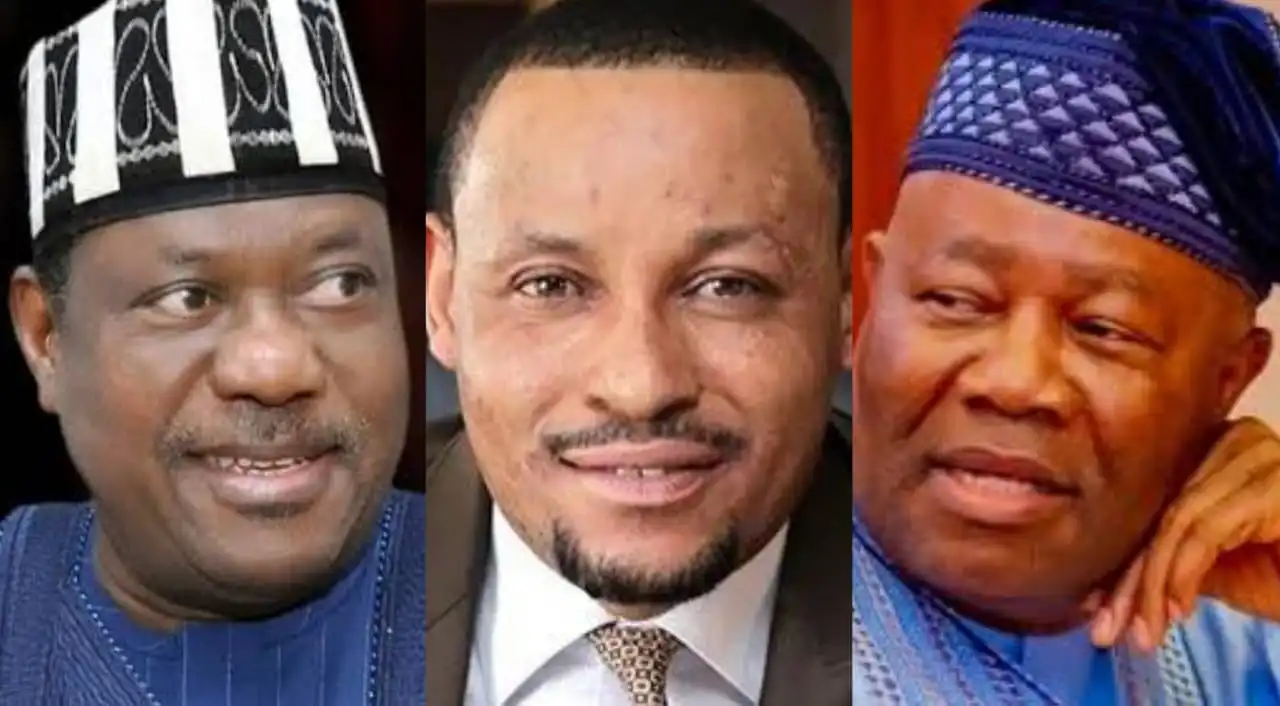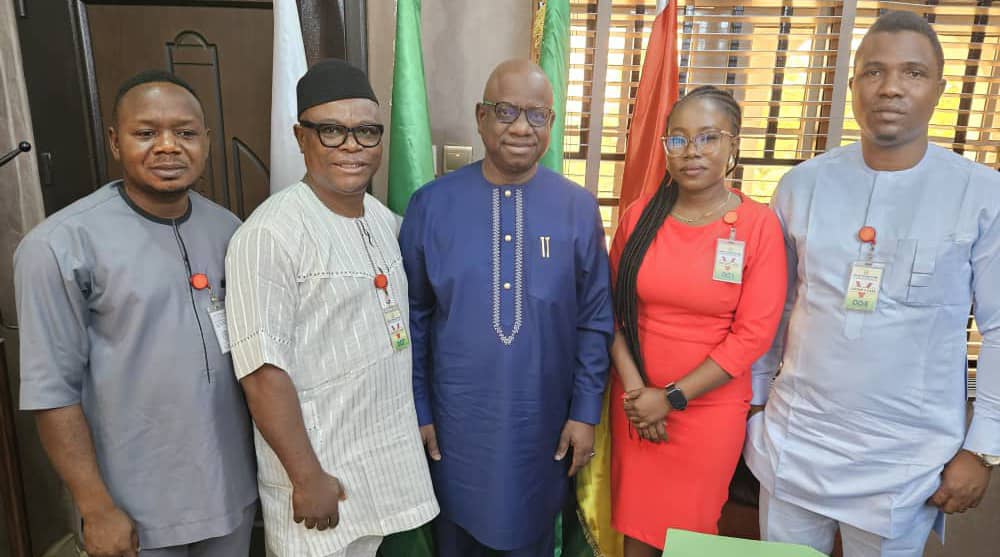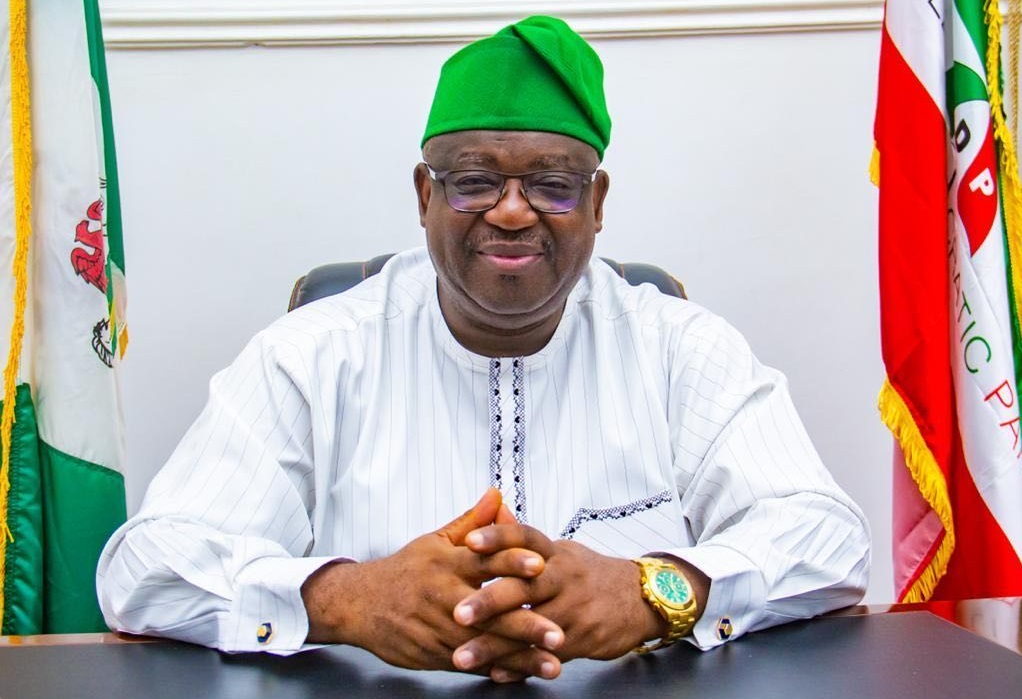News
SGF Goofs in Backdated Letters on CCT Chairman Appointment with Conflicting Serial Numbers

The desperate attempt to remove the embattled Code of Conduct Tribunal (CCT) Chairman, Mr. Danladi Umar, has taken a controversial turn, raising serious questions about procedural irregularities and constitutional breaches.
Following previous missteps, including the premature announcement of a new CCT Chairman by former Presidential Spokesperson Ajuri Ngelale and the National Assembly’s failure to meet the required quorum, the Secretary to the Government of the Federation (SGF), Senator George Akume, has further complicated the situation. He issued two conflicting letters, both backdated to give the appearance of a legitimate transition, but riddled with inconsistencies in dates and serial numbers.
Contradictions in Disengagement and Appointment Letters
Documents obtained by PRNigeria reveal that the letter disengaging Umar from his position as CCT Chairman was dated January 6, 2025, but backdated to take effect from November 26, 2024. However, a separate letter appointing Dr. Mainsara Umar Kogo as the new Chairman was dated January 20, 2025, yet was also backdated to take effect from November 27, 2024—just a day after Umar’s removal.
Most notably, the reference numbers on these documents contradict the chronological sequence of events. The disengagement letter issued to Umar bears the reference number SGF.19/S.24/C.1/T/177, while the appointment letter for Kogo, issued 14 days later, inexplicably carries an earlier reference number: SGF.19/S.24/C.1/T/176. This suggests Kogo’s appointment was documented before Umar’s removal, further exposing irregularities in the process.
Omission of Constitutional Justifications
Another glaring inconsistency is the SGF’s failure to cite the relevant constitutional provisions in Umar’s disengagement letter. The letter merely states:
“I write to inform you that His Excellency, Bola Ahmed Tinubu, GCFR, President, Federal Republic of Nigeria, in the exercise of his powers, has approved your disengagement as Chairman, Code of Conduct Tribunal, with effect from 26th November, 2024, following the resolution of the National Assembly. While conveying Mr. President’s appreciation to you for your services to the nation during your tenure, may I wish you God’s guidance and best of luck in your future endeavors.”
In contrast, Kogo’s appointment letter explicitly references Paragraph 15(3) of the Fifth Schedule of the 1999 Constitution (as amended) and Section 20(4) of the Code of Conduct Bureau and Tribunal Act, Laws of the Federation of Nigeria, 2004. This omission raises questions about the legality of Umar’s removal, as the constitutional process for such an action appears to have been ignored.
Legal Violations in Umar’s Removal
Meanwhile, the 1999 Constitution, as amended and cited by SGF, clearly outlines the procedure for appointing and removing a CCT Chairman: Paragraph 15(3) of the Fifth Schedule: “The Chairman and members of the Code of Conduct Tribunal shall be appointed by the President in accordance with the recommendation of the National Judicial Council (NJC).”
Paragraph 17(3) of the Fifth Schedule: “A person holding the office of Chairman or member of the Code of Conduct Tribunal shall not be removed from his office or appointment by the President except upon an address supported by a two-thirds majority of each House of the National Assembly, praying that he be so removed for inability to discharge the functions of the office in question (whether arising from infirmity of mind or body), for misconduct, or for contravention of this Code.”
Paragraph 17(4) of the Fifth Schedule: “A person holding the office of Chairman or member of the Code of Conduct Tribunal shall not be removed from office before the retiring age except in accordance with the provisions of this Code.”
Despite these constitutional safeguards, there is no evidence that that the National Judicial Council (NJC), chaired by Chief Justice of Nigeria, Justice Kudirat Kekere-Ekun, recommended a new CCT Chairman. There is also no evidence that the National Assembly met the two-thirds majority requirement for Umar’s removal.
Moreover, there is no also evidence suggesting that both houses of the National Assembly have met the required quorum or followed the proper procedures for engaging and disengaging a CCT Chairman. This matter is currently before Justice James Omotosho of the Federal High Court before the recent letters.
Interestingly, despite the purported dismissal, Umar has been invited by the police for questioning over allegations of “Obstruction and Conduct Likely to Cause Breach of Peace.”
FG’s Track Record of Blunders on CCT Leadership
This is not the first time the Federal Government has mishandled attempts to remove the CCT Chairman. In 2024, the Senate, led by Senator Godswill Akpabio, attempted to invoke Section 157(1) of the 1999 Constitution to remove Umar, citing allegations of and misconduct. However, a PRNigeria fact-check revealed that Section 157 applies to the Code of Conduct Bureau (CCB), not the CCT, making the move legally untenable.
Additionally, the Senate previously confused the appointment of Abdullahi Usman Bello, who was cleared to chair the CCB, with that of the CCT—another embarrassing legal misstep.
Targeting Umar: Political or Legal?
Curiously, following his contested removal, Umar has now been invited by the police for questioning over allegations of “Obstruction and Conduct Likely to Cause a Breach of Peace.” This development raises concerns that his removal might be politically motivated rather than based on any proven misconduct.
As the controversy unfolds, legal experts and constitutional scholars argue that the Federal Government’s handling of the CCT leadership transition not only violates established legal procedures but also raises serious credibility concerns about the administration’s adherence to the rule of law.
The series of blunders, including backdated letters, contradictory serial numbers, and the omission of constitutional requirements, raises serious doubts about the legality of Danladi Umar’s removal and Mainsara Umar Kogo’s appointment. Without adherence to due process, the Federal Government risks another embarrassing legal defeat, further eroding public trust in its governance.
Credit: PRNigeria
News
Guinea Woos Nigerian Investors to Join $20bn Projects

News
Nigeria’s inflation jumps to 24.23% in March 2025

Nigeria’s headline inflation rate rose to 24.23% in March 2025, according to the official government data source, the Nigeria Bureau of Statistics (NBS).
The rise in the country’s inflation rate, from 23.18% back in February 2025 to 24.23% in March 2025, reflected a major increase in the rising commodity and energy costs in the last few weeks.
According to the March 2025 Consumer Price Index (CPI) Report which measures the inflation rate released by the government agency on Tuesday, the country’s food inflation rate was 21.79% year-on-year in March 2025.
The food inflation rate, however, showed a decrease compared to the food inflation rate of 23.51% recorded in February 2025.
Economists had predicted that the country’s inflation rate which decreased minimally in February would rise when the Dangote Refinery and the state-run NNPCL got entangled in a petrol price war that culminated in the temporary termination of a naira-for crude agreement between the two oil companies and the subsequent increase in the pump price of petrol.
Some observers had also said the minimal reduction in the prices of food commodities experienced earlier in February was not sustainable, attributing the temporary decline in the prices of food to the importation intervention of the Federal Government.
Food and commodity inflation have skyrocketed as Nigerians battle what can pass for the worst cost of living crisis since the country’s independence over six decades ago, a development that economic wizards have attributed to President Bola Tinubu’s twin policies of petrol subsidy removal and unification of the forex rates.
News
Plateau 51: Mutfwang mourns, says “we failed you”, begs affected community

Governor Caleb Mutfwang of Plateau State has apologised to the people of Bassa Local Government Area (LGA) for the failure of government and security agencies to protect lives and properties.
Fifty-one persons were gunned down early Monday in the Zikke community of the LGA, with houses razed and many displaced about two weeks after a similar attack led to the killing of scores of persons in Bokkos Local Government Area.
Less than two days after the most recent assault, Governor Mutfwang apologised for the government’s inability to protect the people.
Fifty-one persons were gunned down early Monday in the Zikke community of the LGA, with houses razed and many displaced about two weeks after a similar attack led to the killing of scores of persons in Bokkos Local Government Area.
Less than two days after the most recent assault, Governor Mutfwang apologised for the government’s inability to protect the people.
The governor said this on Tuesday at the palace of the Paramount Ruler in Miango.
“I will tell you the truth: I have been crying since yesterday because I had trusted God that all the arrangements were put in place, that this will not happen again. We have made investments in security,” he said.
But like all human arrangements, sometimes they fail. I want to admit that on Sunday night into Monday morning, we failed you. Please, forgive me.”
He urged the people not to relent in their efforts to secure their communities and ensure that they complement security agencies’ efforts by providing vital information for intelligence gathering and expose the antics of the criminals.
Governor Mutfwang, in the company of security chiefs and members of the state executive council, was in Zikke community to commiserate with the people on the death of over fifty persons killed in Monday’s attacks.
The Paramount Ruler of Irigwe land, Ronku Aka, who is the Brangwe of Irigwe, urged the government to come to the aid of the communities with the provision of social amenities in the area.
The governor and the entourage also went to see some of the families who lost their loved ones in the attack. The victims have been buried just as members of the community demanded action to stem the rising wave of insecurity in the state.
Plateau State has been a hotbed of attacks, but the renewed spate of attacks adds a fresh layer of twist to the decades-long crisis rocking the North-Central state.
After the most recent assaults, President Bola Tinubu ordered security agencies to fish out the masterminds, describing the attacks as condemnable.
While experts have linked the lingering Plateau crisis to farmers-herders tussle for resources, Governor Muftwang said it was sponsored and genocidal.
According to him, over 64 communities in the state have been taken over by gunmen.
-

 News13 hours ago
News13 hours agoSHOCKING! One month after giving birth, woman discovers another baby in her womb
-

 News13 hours ago
News13 hours agoTears, anguish as Plateau Community buries 51 killed by bandits
-

 News11 hours ago
News11 hours agoCBEX: 60 fraudulent Ponzi scheme operators to avoid in Nigeria
-

 News12 hours ago
News12 hours agoAngry investors raid CBEX office, loot assets in Ibadan after digital Platform crash
-

 News19 hours ago
News19 hours agoPeter Obi speaks as Benue govt. blocks humanitarian visit
-

 News19 hours ago
News19 hours agoFUOYE VC suspended over sexual harassment allegations
-

 Politics13 hours ago
Politics13 hours agoIgbo Youths Set To Mobilize 5 Million Man-March In Support Of Tinubu, Kalu
-

 News12 hours ago
News12 hours ago‘Not something I’d wish on anyone’ — Melinda Gates opens up on divorce


















